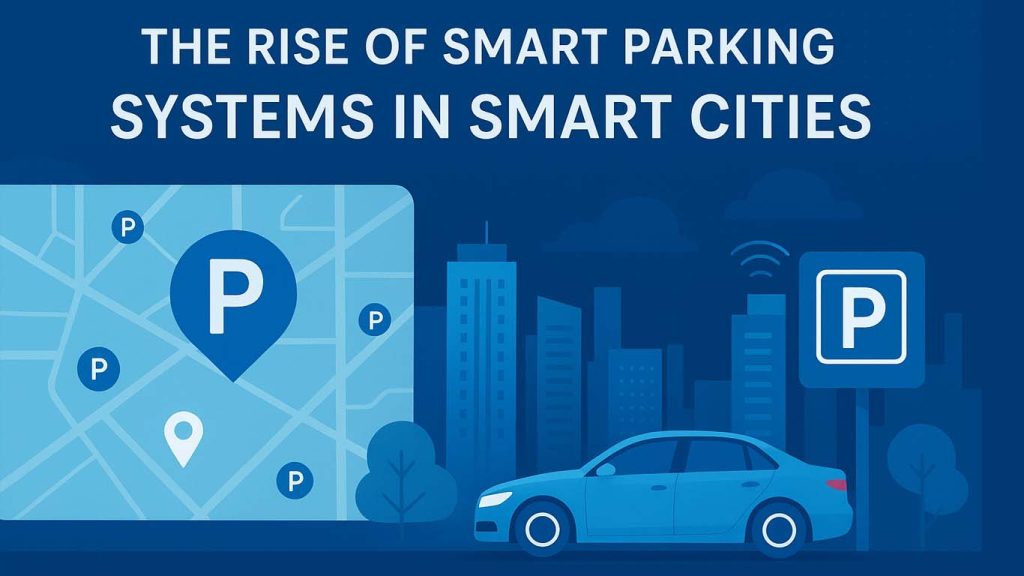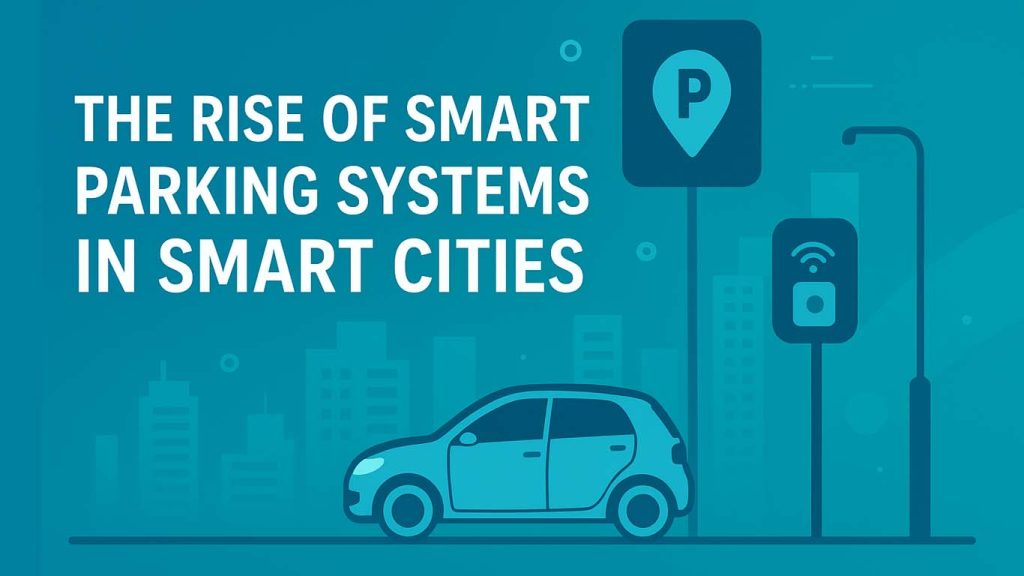
The Rise of Smart Parking Systems in Smart Cities
Introduction
Cities around the world are rapidly evolving to become smarter, greener, and more efficient. From intelligent traffic management to IoT-enabled energy grids, urban areas are embracing technology to improve the quality of life for citizens. One of the most overlooked but critical challenges in urban environments is parking. Finding a parking spot in a congested city can be a daily struggle, wasting both time and fuel while contributing to pollution and traffic congestion.
This is where smart parking systems come into play. Leveraging the Internet of Things (IoT), sensors, mobile apps, and artificial intelligence, smart parking solutions are revolutionizing how vehicles are parked, managed, and monitored in smart cities. By 2025 and beyond, these systems are becoming an integral part of the smart city ecosystem, offering efficiency, sustainability, and convenience for drivers and urban planners alike.
This blog explores the rise of parking, its technology, benefits, challenges, real-world applications, and its transformative role in shaping the cities of the future.
What is Smart Parking?
Smart parking is a technology-driven solution designed to optimize the use of parking spaces in urban areas. It uses IoT sensors, cameras, data analytics, and mobile applications to monitor and manage parking availability in real time. Drivers can easily locate available spaces using navigation apps, reducing the time spent searching for parking.
Key elements of parking systems include:
- IoT Sensors: Installed in parking spots to detect whether a space is occupied or vacant.
- Cameras & Computer Vision: Used to monitor parking areas and improve security.
- Mobile Apps: Allow drivers to reserve spots, make cashless payments, and receive parking guidance.
- Data Analytics: Helps city planners optimize parking space allocation and traffic flow.
- Automated Payment Systems: Digital payments and e-wallets streamline transactions.
The Growing Need for Smart Parking in Cities
Urbanization has dramatically increased the demand for efficient parking solutions:
- Rising Car Ownership – As more people own cars, the competition for parking spaces intensifies.
- Traffic Congestion – Studies show that up to 30% of urban traffic is caused by drivers searching for parking.
- Environmental Concerns – Circling around for parking leads to higher carbon emissions.
- Time Efficiency – On average, drivers spend 15–20 minutes daily searching for parking, adding stress and wasted productivity.
- Space Utilization – Many parking lots and garages remain underutilized due to poor visibility and management.
Smart parking addresses all these issues by providing real-time information, automated systems, and better management of urban parking resources.

How Smart Parking Works
A typical smart parking system integrates several technologies:
1. IoT Sensors
Sensors embedded in the ground or attached overhead detect whether a parking space is occupied. These sensors send signals to a central server.
2. Cloud-Based Data Processing
Data from sensors and cameras are sent to a cloud platform where they are processed and analyzed.
3. Mobile and Web Applications
Drivers access this information via apps, which guide them to the nearest available parking spot.
4. Automated Payments
Payment integration allows users to pay via e-wallets, debit/credit cards, or mobile payment apps.
5. Data Analytics for Cities
City administrators can analyze parking usage patterns, optimize pricing, and allocate resources more efficiently.
Benefits of Smart Parking
1. Reduced Traffic Congestion
By guiding drivers directly to available parking spaces, smart parking minimizes unnecessary driving and reduces overall traffic.
2. Time Savings
Drivers save valuable time by finding parking quickly, improving overall urban productivity.
3. Lower Pollution
Reduced vehicle idling leads to lower carbon emissions, making cities more environmentally sustainable.
4. Cost Efficiency
Smart systems reduce the need for additional parking infrastructure by maximizing the use of existing spaces.
5. Enhanced User Convenience
Cashless payments, pre-booking options, and navigation assistance make parking hassle-free.
6. Better Revenue Management for Cities
Dynamic pricing and automated fee collection allow municipalities to generate more consistent revenue.
7. Increased Safety
Smart parking lots equipped with cameras and sensors improve security for both vehicles and pedestrians.
Technologies Driving Smart Parking
The rise of smart parking systems has been fueled by innovations in several technologies:
- Internet of Things (IoT): Enables real-time communication between sensors and central platforms.
- Artificial Intelligence (AI): Analyzes traffic and parking patterns to optimize operations.
- Big Data Analytics: Helps cities predict peak usage times and plan accordingly.
- 5G Connectivity: Ensures faster and more reliable data transfer for real-time applications.
- Augmented Reality (AR): Future apps may overlay parking guidance directly onto drivers’ windshields or smartphones.
- Blockchain Payments: Secure, transparent transactions for parking fees.
Real-World Applications of Smart Parking
Barcelona, Spain
Barcelona is one of the pioneers in implementing smart parking. The city uses IoT sensors across thousands of parking spots, and drivers can use mobile apps to find, reserve, and pay for spaces.
San Francisco, USA
San Francisco’s SFpark program adjusts parking prices dynamically based on demand, using data from sensors and meters. This reduces congestion and optimizes parking availability.
Singapore
Singapore integrates smart parking into its broader smart nation initiative, combining cashless payments, real-time updates, and automated enforcement.
Dubai, UAE
Dubai has invested heavily in smart parking, offering features like pre-booking and cashless payments in malls and business districts.
The Role of Smart Parking in Smart Cities
Smart parking is a vital component of smart cities because it directly impacts mobility, sustainability, and quality of life. Here’s how:
- Mobility: Efficient parking reduces traffic congestion, making urban transportation smoother.
- Sustainability: Reduces emissions and fuel consumption.
- Economic Growth: Improves urban productivity and encourages more efficient business operations.
- Data-Driven Governance: Provides insights for city planners to make informed decisions.
- Integration with Smart Mobility: Works hand-in-hand with autonomous vehicles, electric cars, and ride-sharing platforms.
Challenges of Implementing Smart Parking
Despite the benefits, smart parking faces challenges:
- High Initial Costs: Installing sensors and infrastructure requires significant investment.
- System Maintenance: Keeping IoT sensors and cameras functional requires ongoing maintenance.
- Data Security: Protecting user data and preventing cyberattacks is crucial.
- User Adoption: Drivers must be willing to use apps and adapt to digital payments.
- Scalability: Expanding systems across entire cities can be complex and costly.
Future Trends in Smart Parking
By 2030, smart parking will evolve in exciting ways:
- Integration with Autonomous Vehicles: Self-driving cars will park themselves in smart parking lots.
- AI-Powered Predictions: AI will predict parking availability before drivers even reach their destination.
- Smart Parking for Electric Vehicles (EVs): Spaces will include charging stations, integrating parking and energy solutions.
- AR Navigation Systems: Real-time AR guides will help drivers park faster and safer.
- Shared Economy Models: Platforms may allow private homeowners to rent out unused parking spaces via smart apps.
Case Study: Smart Parking and EV Integration
Electric vehicles (EVs) are on the rise, and smart parking systems will play a pivotal role in supporting them. Smart EV charging stations embedded in parking spaces will allow vehicles to charge while parked. Cities like Oslo and Amsterdam are already experimenting with this model, ensuring EV adoption grows hand-in-hand with smart city development.
Societal Impact of Smart Parking
The adoption of smart parking goes beyond convenience—it reshapes urban life:
- Improved Quality of Life: Less time searching for parking means reduced stress for drivers.
- Health Benefits: Reduced emissions improve air quality and public health.
- Digital Transformation: Encourages citizens to adopt digital payments and apps.
- Accessibility: Smart systems can prioritize parking for people with disabilities.
Conclusion
As cities continue to grow and urban mobility becomes more complex, smart parking is no longer a luxury—it’s a necessity. By reducing congestion, lowering emissions, saving time, and improving safety, smart parking systems are essential to the development of sustainable smart cities.
The rise of smart parking reflects the broader shift toward intelligent urban infrastructure. While challenges such as costs and cybersecurity must be addressed, the long-term benefits far outweigh the drawbacks. By 2025 and beyond, smart parking will play a central role in shaping the smart cities of tomorrow—creating urban environments that are efficient, sustainable, and livable for everyone.
Frequently Asked Questions: The Rise of Smart Parking Systems in Smart Cities
1. What is a smart parking system?
A smart parking system uses sensors, IoT devices, cameras, and mobile applications to help drivers find, reserve, and pay for parking spaces efficiently in real time.
2. Why are smart parking systems important for smart cities?
They reduce traffic congestion, cut down fuel waste, improve air quality, and save time for drivers while making city transport systems more efficient.
3. How do parking systems work?
They rely on sensors and cameras installed in parking lots or streets to detect available spots. Data is sent to a central platform, which updates drivers via apps or digital boards.
4. What technologies power parking systems?
Key technologies include IoT sensors, AI algorithms, cloud computing, mobile apps, GPS navigation, RFID, and license plate recognition.
5. How do drivers access parking services?
Drivers can use dedicated mobile apps or city-wide platforms to check space availability, reserve a spot, navigate to it, and pay digitally.
6. What benefits do smart systems offer to drivers?
- Saves time in finding spaces
- Reduces stress and fuel costs
- Enables cashless, contactless payments
- Offers real-time availability updates
7. How do smart parking systems benefit city authorities?
They help optimize urban space usage, generate parking revenue, enforce regulations effectively, and improve traffic management with data-driven insights.
8. Can smart systems reduce pollution?
Yes, by reducing the time cars spend idling and searching for parking, smart systems cut unnecessary emissions, improving overall urban air quality.
9. Are smart parking systems expensive to implement?
Initial setup costs (sensors, cameras, and digital infrastructure) can be high, but cities recover investments through increased efficiency, revenue, and reduced congestion costs.
10. Which cities are leading in parking adoption?
Cities like Singapore, Barcelona, Amsterdam, Los Angeles, and Tokyo are pioneers, using large-scale smart parking networks to improve urban mobility.
11. How does AI enhance smart parking systems?
AI analyzes traffic and parking data to predict availability, suggest the nearest spot, and optimize pricing based on demand.
12. What role does dynamic pricing play in smart ?
Dynamic pricing adjusts fees based on demand, time of day, and location, helping balance usage and ensuring spaces are always available.
13. Are parking systems integrated with EV charging?
Yes, many systems now include EV charging stations, allowing users to reserve a spot and charge their vehicles simultaneously.
14. How do smart parking systems improve safety?
They reduce illegal parking, minimize traffic accidents caused by sudden stops, and enhance surveillance with cameras for crime prevention.
15. Can smart parking systems work with autonomous vehicles?
Absolutely. In the future, autonomous cars will use smart parking platforms to find, navigate to, and park in available spaces without human intervention.
16. Do parking systems work in both public and private areas?
Yes. They can be deployed in public streets, municipal lots, airports, malls, universities, and corporate campuses.
17. How do payment systems work in smart ?
Payments are typically cashless via mobile wallets, credit/debit cards, NFC, or integrated city smart cards.
18. What are the challenges in adopting smart systems?
- High infrastructure costs
- Integration with legacy systems
- Data privacy and cybersecurity risks
- Public awareness and adoption rates
19. Can smart data be used for city planning?
Yes, data collected helps city planners understand traffic flow, peak parking demand, and urban space utilization, leading to better transport policies.
20. What is the future of parking in smart cities?
Expect wider adoption of AI-driven predictions, blockchain-based secure payments, full EV integration, and autonomous parking—all contributing to seamless mobility ecosystems.
Related:
